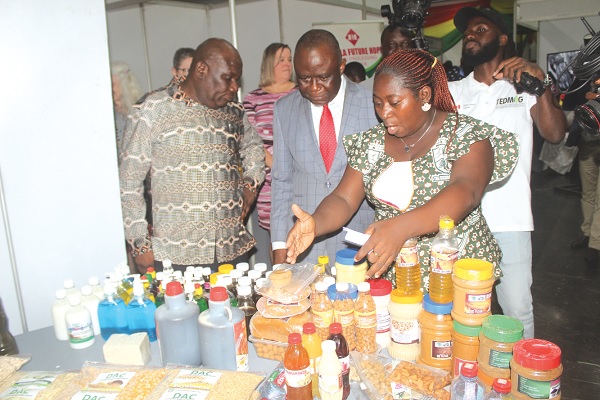
3,242 students receive training in modernised agriculture
A government programme to build the capacity of extension officers for modernised agriculture has so far trained 3,242 persons.
Advertisement
They received training in different fields from the various agricultural colleges of education in the country.
Currently, 2,048 more officers are undergoing similar training in agricultural colleges.
In addition, 228 tutors have been trained on the five revised curricula, communication, pedagogy skills, gender, agribusiness and entrepreneurship.
The training of the personnel forms part of a Ministry of Food and Agriculture (MOFA) technical capacity-building component programme known as, Technical Education Development for Modernised Agriculture in Ghana (TEDMAG) project.
A Deputy Minister of Food and Agriculture, Yaw Frimpong Addo, who disclosed this in Accra, said the officers received training in areas such as concepts in agribusiness, farm management and practical value chain development at the country’s agricultural colleges of education, namely Ejura, Kwadaso, Damongo and Ohawu Agric Colleges; Wenchi Farm Institute and the Animal Health and Production College.
“The newly created student-managed farms and college commercial projects in the five colleges are providing students with the needed practical skills that emphasise all aspects of the agricultural value chain in various agricultural products.
TEDMAG has rehabilitated and retooled science laboratories in the five agricultural colleges, he said at the closing ceremony of the TEDMAG project in Accra on Thursday, February 23.
What is the TEDMAG project
TEDMAG project is a Canadian government-sponsored project with MOFA. The objective of the project, which started six years ago and the closing ceremony marked its symbolic end, had been categorised under three components, namely to upgrade the curriculum of the five agricultural colleges to make them more market-oriented, value chain centred and gender sensitive.
The second component was extension delivery, which aimed to build the capacity of agric extension agents and leaders of farmer-based organisations with a focus on value chain management, processing and market-oriented practices.
The third component, among others, saw an overhaul in the physical infrastructure of the colleges such as the ICT units, laboratories and libraries.
TEDMAG Successes
Throwing light on the success of the TEDMAG project, Mr Addo said it had provided some 30-seater Toyota Coaster buses to the five colleges of education in an effort aimed at facilitating field visits and external learning, as well as video conferencing equipment to enhance communication.
The Head of Cooperation at the Canadian Embassy in Ghana, Kathleen Flynn-Dapaah, said it was the hope of Canada that the investments made would continue to yield good results after the exit of the initiative and that the Government of Ghana and other stakeholders would find ways to integrate the gains of TEDMAG into their mainstream programming.
She disclosed that Canada was providing $125 million to the Government of Ghana under the modernising agriculture in Ghana project to help modernise the agriculture sector, which had significant potential for reducing poverty and inequality in the country.
Explaining how the project came to be, the Project Manager of TEDMAG, Derrick Owusu-Ansah, said they realised that for some time, when agriculture extension agents were employed, in-service training became a challenge and although non-governmental organisations tried to help with such training, it was not uniform across the country.
He said they also realised that the training for the agricultural extension agents was more focused on them being employed by the government but as the government’s resources kept dwindling and for that matter not being able to employ more, they became unemployed making the agricultural sector unattractive to the youth.
The ministry, therefore, approached the consortium to provide technical education development across the country.
Initially, he said the consortium worked with the five colleges of education but when Wenchi Farm Institute was upgraded, it was added to the project.



